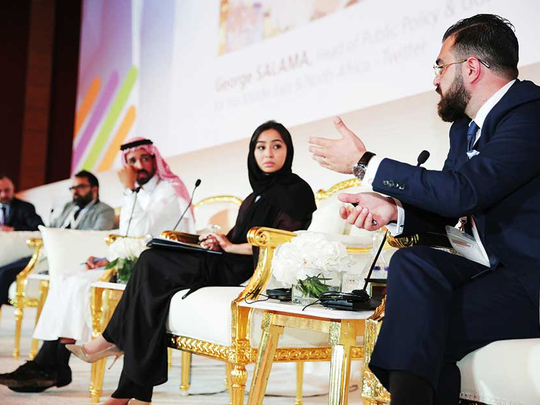
Riyadh: The Riyadh Forum on Countering Extremism and Fighting Terrorism, under the sponsorship of the Islamic Military Counter Terrorism Coalition held an open discussion on confronting terrorism on Monday.
“The Islamic world looks like the Europe of 1945, and we need a cultural Marshal Plan to rebuild our region,” Lebanese journalist Nadim Koteich said.
“The alliance between terrorists and extremists is very fragile and we must use all our powers to stop terrorism by reducing violent extremism,” he added.
The panel discussed in detail the conflict in Yemen as a microcosm of the larger situation in the region.
With all the global attention on Daesh, many have forgotten about Al Qaida which has taken advantage of the distracted attention, to rebuild and establish itself in ungoverned areas throughout the region.
It found the most fertile ground to flourish in Yemen, a poor country engulfed in political turmoil.
Saudi Arabia, and its coalition partners have since been working to crackdown on Al Qaida in Yemen.
In Yemen, Al Qaida members have disguised its terrorist activities by posing as community leaders, the panellists pointed out.
They help people in need and address grass roots problems in society in areas where the government is weak or there is a political vacuum.
“The problem with Al Qaida in Yemen is people are accepting them and not confronting them,” Elisabeth Kendal, Senior Fellow, University of Oxford said.
“My research shows that over 56 per cent of tweets analysed in Yemen were about Al Qaida working in community development and making positive change in Yemen,” she said.
The panel emphasised that this tactic is gaining support in communities not only in Yemen but in many of the ungoverned areas in some states. Without committed and strong governments, and non-governmental organisations’ involvement to strengthen communities, terrorists will always manage to gain a foothold in the MENA (Middle East and North Africa) region.
“Failing states in the MENA region provide a hotbed for terrorist recruitment and activities. We must have regional leadership from countries like Saudi Arabia, to help support the governments throughout the region if we are to create stability,” said Jack Caravelli, senior adviser, Global Resource Partnership.
The panellists provided also their insights into the relationship between terrorist activities and criminal organisations. The nexus is a very close one as both terrorist and criminals profit and fund their efforts through illegal methods.
“Petty crimes can be seen in the background of all people conducting terrorist activities in the West,” Hurley said.
“These individuals are already subjects of interest to law enforcement but the connection between crime and terrorism is often overlooked,” he said.
The panel was very concerned about the relationship between prisons and radicalisation. Without developing programmes and treatment within the prison system they will continue to be hotbeds for extremists and terrorist recruitment.
They also discussed the worldwide connection of organised criminal activity and the financing of terror.
“Criminal activity in one country may be financing terrorism in other countries. We must not overlook even petty crimes as they can lead to bigger terrorist activities in other areas of the world,” Baur said.










